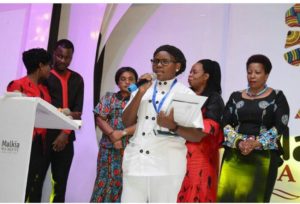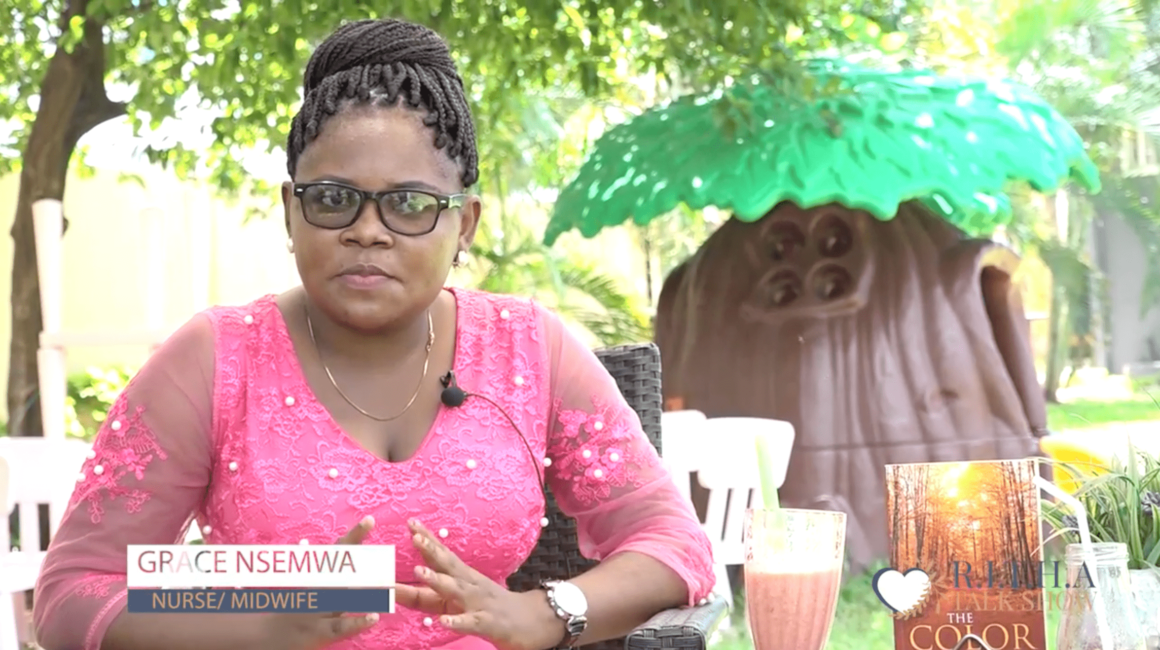Grace Thadei Msemwa, is a Tanzanian born at Mtibwa ward, Mvomero District in Morogoro Region. She completed both her primary and secondary education at Mtibwa Primary and Secondary school. In 2012, Grace joined the Public Health Nursing school in Morogoro, obtaining her Enrolled Nurse certification, in 2014, in Nursing and Midwifery. In 2018, upon completing her diploma in Nursing and Midwifery, from Kairuki School of Nursing, she became a Registered Nurse. Presently, she is a nurse and midwife working in various hospital wards and departments – Maternity, Medical, Surgical and Pediatric Wards; the Reproductive and Child Health department (RCHC), the Care and Treatment Center (CTC) and the Outpatient Department – at Mkuranga District Hospital. Her main goal is to care for the sick, ensuring that they recover and attain good physical, mental and emotional health.
Grace has participated and appeared in various local media interview outlets to speak on her advocacy for maternal health, empowering girls and students, as well as on midwifery and nurse ethics matters. In 2018, Clouds Media Group Tanzania, one of the most reputable media outlets in the country, recognized Grace as “Malkia Wa Nguvu”. The award, which honors women who have played a significant role in Tanzania, acknowledged Grace’s selfless contributions, in the health sector as a nurse and midwife, towards helping pregnant women through safe delivery.
What led you to pursue a career in health?
To be in the health sector is my passion. What motivates me to pursue a career in health is my drive to serve people, both in the hospital and the community, and to help sick patients recover. A plus is that being in the health sector provides me with an income that I can use to survive in life and to help my family.
What are you most proud of?
Firstly, I am proud to be a Nurse/Midwife professional which allows me to touch the lives of people. In my profession, I learn many things surrounding health matters which enables me to diagnose and treat diseases.
For example, when I receive a pregnant mother at the labor ward or in the delivery room, I ensure that as a midwife, I participate actively in helping the mother undergo a safe delivery, show appreciation to her by congratulating her and assist her with breast feeding. I am also equally as proud when I provide clients and community members with the right medication to help them recover, provide counseling on health topics and the positive feedback I receive. Working on programs that positively influence girls to study science subjects is also something that I feel proud about.
How have you contributed towards improving health in your community?
I am the champion of reducing maternal and child death at Mkuranga District. I started the Program called ”MKUNGA NYUMBANI KWAKO”, a Swahili phrase which translates to a professional midwife that visits pregnant women in their homes. As its name signifies, we go house to house to visit pregnant women and provide maternal health education to the expecting mother, her relatives, and the community around her in order to reduce Maternal and infant death. The program is a door to door visitation.
Additionally, I initiated the program called “I Can Project” which targets young girls in primary and secondary school to influence them to study the sciences and encourage more female scientists in the country. I also work with the young girls to help them work towards achieving their goals and fulfilling their dreams.
What are some of the biggest challenges you have faced? How did you overcome them? What are some of the lessons learnt?
 Some of the challenges I have faced include transportation and infrastructure challenges which makes it difficult to reach participants or community members in the villages I work with. The lack of support and financial challenges also made it difficult.
Some of the challenges I have faced include transportation and infrastructure challenges which makes it difficult to reach participants or community members in the villages I work with. The lack of support and financial challenges also made it difficult.
The poor health knowledge faced by the community as well as the unavailability of equipment to support pregnant mothers during delivery have also posed as a challenge for maternal health. Limited resources and job aids for trainings, particularly geared towards young female students, further limits the impact of the initiatives.
To overcome some of these challenges, I use a portion of my salary to cover transportation costs to the village to sensitize the community, particularly young girls, on health education. There is still more to be done.
What are your views on mentorship and how, if applicable, is it playing a role in your career advancement?
There are many opportunities for women in health on the African continent. But there is a more urgent need for us in our society, particularly in the most remote areas where much is needed to help other women in the community.
What advice do you have for other women in health?
The advice I have for other women in health is to be creative, to love what we do and to work hard. Our community needs us very much, we must ensure that we are a source of information for others to know about health matters. Commitment, respect, cooperation and love are qualities that are very important in the advancement of the health of our communities.


Leave a Reply